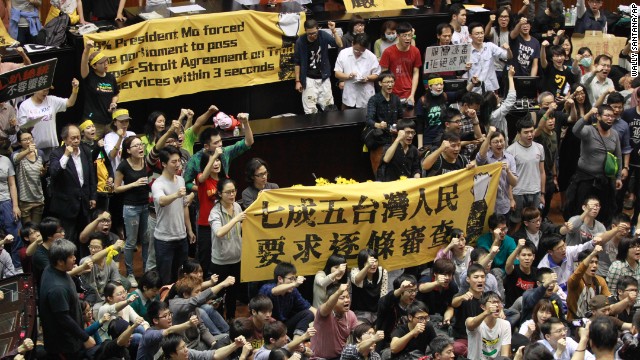On March 17th, 2014, the Kuomingtang party, the political majority in Taiwan, forced a trade pact with China through the island’s government, overriding the Taiwanese Legislature in an executive action by President Ma Yingjeou. This action elicited public outcry because it is seen as a violation of democratic process. The following morning, hundreds of Taiwanese students broke into and blocked the entrance of the Taiwanese government’s legislative building, known as the Legislative Yuan. The students have remained barricaded in the building since March 18th. Authorities have not dispersed them so far. Wang Jinpyng, speaker of the Taiwanese Legislature, issued a statement that he would not seek the protester’s forced removal. Mr. Wang is of the Kuomingtang party.
The university students in the Legislative Yuan advocate for two main changes in current Taiwanese politics: due legislative process for all bills and complete discarding of the Chinese trade agreement.
True representative democracy
Many feel that the KMT’s push on March 17th refutes the spirit of democracy and find issue with the agreement on a political and economic level. Lin Feifan, one of the protest’s leaders, said the fact that “the opinions of workers were not consulted” is a major concern. General feeling holds that deliberation over this agreement occurred entirely without proper representation. The student movement, therefore, has vowed to stay in the Legislative Yuan until democratic order is restored. The government’s response to the Legislative building’s occupants may set a future precedent for Taiwanese politics. As one of the democratic leaders in East Asia, Taiwan’s actions may have implications for policy beyond this Chinese trade pact. The protest’s push for legislative review of this bill is therefore of great importance.
The Taiwan-China animosity
To understand why protesters specifically object to the Taiwan-China trade agreement, one must first examine the history between the governing parties of each. Taiwan, officially the Republic of China, is run by the Kuomingtang, who believe themselves the rightful rulers of all of China. (This is, of course, now mostly a view held by extremists in the KMT and no one else.) Conversely, the mainland’s People’s Republic of China maintains a stance that Taiwan is only a rebellious province of China. Beijing has long sought to re-acquire Taiwan completely, as the island was once definitively part of the larger nation. Both these positions have long instituted hostile relations between the two governments and their peoples, as Taiwan is threatened by China and Taiwan frustrates China with its independence.
With a deeply rooted dislike towards mainland China, therefore, Taiwanese citizens have begun voicing their support for the Legislative Yuan occupiers. Saying that “Taiwan will vanish” as Hong Kong did – meaning it will lose its sovereignty and political power – the Taiwanese public identifies a fear that the trade agreement will allow China to get an economic hold on Taiwan and force it into submission. Because President Ma’s push would have allowed such an unpleasant prospect to be realized, the student protesters and supporters feel obligated to stop it. Opposition to this specific piece of legislation stems from national pride and fear of the PRC takeover threatened for years.
A side note: A smaller, more violent attack on the Executive Yuan (neighbor to the Legislative Yuan) on Monday was quickly dispersed with water cannons. The protesters involved with the Legislative building have denounced the action, which left damages to cabinet offices in the building. The larger student movement remains nonviolent.
The beginnings of progress
Now dubbed “The Sunflower Movement (太陽花學運)” or “The March 18th Student Movement (318學運)”, the protesters’ occupation of the Legislative Yuan seems to be working. Along with a countrywide university protest starting yesterday, in which hundreds more students walked out of the island’s colleges and professors are said to have cancelled classes, the movement’s pressure has reached the country’s politicians. Legislators have begun to speak publicly about plans to revisit the trade pact democratically within the next few days. The people of Taiwan appear to be winning their fight to maintain democracy. The events of the next few weeks will determine the future of politics (and possibly sovereignty) in the island nation and East Asia.

